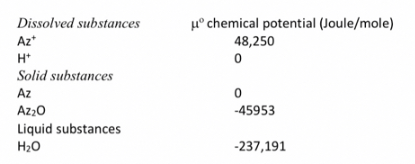10. Calculate the equilibrium potential for the reaction Az₂O + 2H* + 2e = 2Az +H₂O at pH = 12. (a) 0.271 V (b) 0.631 V (c) 0.751 V (d) 0.321 V 11. Calculate the equilibrium potential for reaction for the reaction, Az* +e = Az for [Az*] = 10-6 M. (a) 0.340 V (b) 0.370 V (c) 0.770 V (d) 0.140 V
10. Calculate the equilibrium potential for the reaction Az₂O + 2H* + 2e = 2Az +H₂O at pH = 12. (a) 0.271 V (b) 0.631 V (c) 0.751 V (d) 0.321 V 11. Calculate the equilibrium potential for reaction for the reaction, Az* +e = Az for [Az*] = 10-6 M. (a) 0.340 V (b) 0.370 V (c) 0.770 V (d) 0.140 V
Chemistry
10th Edition
ISBN:9781305957404
Author:Steven S. Zumdahl, Susan A. Zumdahl, Donald J. DeCoste
Publisher:Steven S. Zumdahl, Susan A. Zumdahl, Donald J. DeCoste
Chapter1: Chemical Foundations
Section: Chapter Questions
Problem 1RQ: Define and explain the differences between the following terms. a. law and theory b. theory and...
Related questions
Question
Please solve 11 and 10
![Problems 6-11
Arizonium (Az) is a newly discovered element. Below is a Table listing the chemical potentials
at 300 K of the A* cation and the Az₂O oxide.
Dissolved substances
Az*
H+
Solid substances
Az
Az₂O
Liquid substances
H₂O
μº chemical potential (Joule/mole)
48,250
0
6. Determine the standard potential (Az* = 1M) for the reaction: Az* +e* = Az
(a) 0.400 V.
(b) 0.500 V (c) 0.700 V
(d) 0.800 V
7. Determine the standard potential for the reaction: Az₂O + 2H+ +2e= 2Az +H₂O
(a) 0.991 V
(b) 0.701 V (c) 0.698 V
(d) 1.203 V
8. Calculate the equilibrium constant, K, for the chemical reaction:2Az* + H₂O=Az₂O + 2H*
(a) 10-11.3 (b) 10-10.1 (c) 10-6.0
(d) 10-16.4
(a) 5.5
Dashboard
0
-45953
9. Determine the pH value at which the potential for the two reactions,
Azt +e= Az and Az₂O + 2H+ + 2e = 2Az +H₂O, intersect.
(b) 6.2
-237,191
000
logo
Calendar
(d) 10.1
10. Calculate the equilibrium potential for the reaction Az₂O + 2H+ + 2e = 2Az +H₂O
at pH = 12.
(a) 0.271 V (b) 0.631 V
(d) 0.321 V
11. Calculate the equilibrium potential for reaction for the reaction, Az+ +e* = Az
for [Az*] = 106 M.
(a) 0.340 V (b) 0.370 V
(c) 8.2
(c) 0.751 V
(c) 0.770 V
(d) 0.140 V
5
To Do
Notifications
31
Inbox](/v2/_next/image?url=https%3A%2F%2Fcontent.bartleby.com%2Fqna-images%2Fquestion%2F114e61d5-f1bc-4a90-80d0-667f2c4451e7%2Faa426d53-6f4b-484d-890c-65ce8e31cebe%2Fy1re6di_processed.jpeg&w=3840&q=75)
Transcribed Image Text:Problems 6-11
Arizonium (Az) is a newly discovered element. Below is a Table listing the chemical potentials
at 300 K of the A* cation and the Az₂O oxide.
Dissolved substances
Az*
H+
Solid substances
Az
Az₂O
Liquid substances
H₂O
μº chemical potential (Joule/mole)
48,250
0
6. Determine the standard potential (Az* = 1M) for the reaction: Az* +e* = Az
(a) 0.400 V.
(b) 0.500 V (c) 0.700 V
(d) 0.800 V
7. Determine the standard potential for the reaction: Az₂O + 2H+ +2e= 2Az +H₂O
(a) 0.991 V
(b) 0.701 V (c) 0.698 V
(d) 1.203 V
8. Calculate the equilibrium constant, K, for the chemical reaction:2Az* + H₂O=Az₂O + 2H*
(a) 10-11.3 (b) 10-10.1 (c) 10-6.0
(d) 10-16.4
(a) 5.5
Dashboard
0
-45953
9. Determine the pH value at which the potential for the two reactions,
Azt +e= Az and Az₂O + 2H+ + 2e = 2Az +H₂O, intersect.
(b) 6.2
-237,191
000
logo
Calendar
(d) 10.1
10. Calculate the equilibrium potential for the reaction Az₂O + 2H+ + 2e = 2Az +H₂O
at pH = 12.
(a) 0.271 V (b) 0.631 V
(d) 0.321 V
11. Calculate the equilibrium potential for reaction for the reaction, Az+ +e* = Az
for [Az*] = 106 M.
(a) 0.340 V (b) 0.370 V
(c) 8.2
(c) 0.751 V
(c) 0.770 V
(d) 0.140 V
5
To Do
Notifications
31
Inbox
Expert Solution
Step 1: Interpretation of problem statement
Given Data:

To determine:
Ques 10: Equilibrium potential of
Ques 11: Equilibrium potential of
Step by step
Solved in 6 steps with 13 images

Knowledge Booster
Learn more about
Need a deep-dive on the concept behind this application? Look no further. Learn more about this topic, chemistry and related others by exploring similar questions and additional content below.Recommended textbooks for you

Chemistry
Chemistry
ISBN:
9781305957404
Author:
Steven S. Zumdahl, Susan A. Zumdahl, Donald J. DeCoste
Publisher:
Cengage Learning

Chemistry
Chemistry
ISBN:
9781259911156
Author:
Raymond Chang Dr., Jason Overby Professor
Publisher:
McGraw-Hill Education

Principles of Instrumental Analysis
Chemistry
ISBN:
9781305577213
Author:
Douglas A. Skoog, F. James Holler, Stanley R. Crouch
Publisher:
Cengage Learning

Chemistry
Chemistry
ISBN:
9781305957404
Author:
Steven S. Zumdahl, Susan A. Zumdahl, Donald J. DeCoste
Publisher:
Cengage Learning

Chemistry
Chemistry
ISBN:
9781259911156
Author:
Raymond Chang Dr., Jason Overby Professor
Publisher:
McGraw-Hill Education

Principles of Instrumental Analysis
Chemistry
ISBN:
9781305577213
Author:
Douglas A. Skoog, F. James Holler, Stanley R. Crouch
Publisher:
Cengage Learning

Organic Chemistry
Chemistry
ISBN:
9780078021558
Author:
Janice Gorzynski Smith Dr.
Publisher:
McGraw-Hill Education

Chemistry: Principles and Reactions
Chemistry
ISBN:
9781305079373
Author:
William L. Masterton, Cecile N. Hurley
Publisher:
Cengage Learning

Elementary Principles of Chemical Processes, Bind…
Chemistry
ISBN:
9781118431221
Author:
Richard M. Felder, Ronald W. Rousseau, Lisa G. Bullard
Publisher:
WILEY